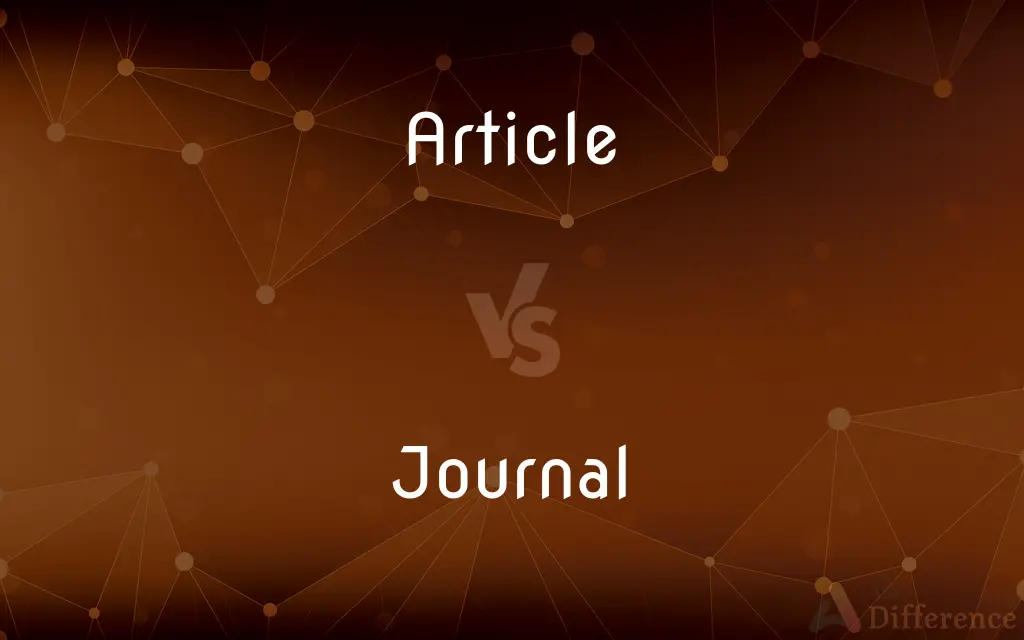Article vs. Journal — What's the Difference?
By Fiza Rafique & Urooj Arif — Published on February 29, 2024
An article is a written piece on a specific topic, found in newspapers, magazines, or journals, while a journal is a collection of articles, often scholarly, focusing on a particular academic field or area of interest.

Difference Between Article and Journal
Table of Contents
ADVERTISEMENT
Key Differences
Articles are individual written works that can cover a wide range of topics, including news, research findings, reviews, and opinion pieces. They are intended to inform, persuade, or entertain the reader and can be found in various publications, including newspapers, magazines, online platforms, and academic journals. The content, length, and style of an article can vary greatly depending on its purpose and the medium in which it is published.
Journals, on the other hand, are periodic publications that compile multiple articles related to a specific academic field or area of interest. Journals are typically scholarly, featuring research studies, reviews of existing research, and theoretical discussions. Each article in a journal is written by experts in the field and undergoes a peer review process before publication to ensure the accuracy and reliability of the information.
The main difference between an article and a journal lies in their scope and function. An article is a singular piece that addresses a specific topic or issue, while a journal is a broader publication that contains a collection of articles on related subjects within a defined field. Articles serve to present individual ideas, findings, or opinions, whereas journals provide a platform for the dissemination and discussion of scholarly work.
Articles are the building blocks of journals, while not all articles are found in journals. The term article encompasses a wide range of written pieces across various platforms, whereas journal specifically refers to a type of publication that focuses on scholarly content within a particular discipline.
Comparison Chart
Definition
A written piece on a specific topic
A collection of articles on a particular academic field
ADVERTISEMENT
Publication Frequency
Varies widely
Periodic (e.g., monthly, quarterly)
Content Type
News, research, opinions, reviews
Scholarly research, reviews, theoretical discussions
Authorship
Journalists, researchers, experts, enthusiasts
Experts and scholars in the field
Review Process
Varies (editorial review, peer review)
Typically undergoes peer review
Purpose
Inform, persuade, entertain
Disseminate scholarly work and research findings
Audience
General public, professionals, academics
Academics, researchers, professionals in the field
Compare with Definitions
Article
A detailed analysis.
The magazine featured an article on climate change impacts.
Journal
Academic publication.
The Journal of Medicine publishes breakthrough medical research.
Article
News reporting.
Newspapers publish articles on current events daily.
Journal
Peer-reviewed articles.
Articles in the Journal of Environmental Science are peer-reviewed.
Article
Research findings.
A scientist published an article on a new discovery in a science journal.
Journal
Specialized field focus.
The Journal of Artificial Intelligence covers advancements in AI.
Article
Opinion piece.
An expert wrote an article expressing views on renewable energy policies.
Journal
Scholarly discussions.
The Philosophy Journal includes articles debating ethical theories.
Article
Review article.
A critic wrote an article reviewing the latest technology gadgets.
Journal
Periodic release.
The Economics Quarterly Journal is published four times a year.
Article
A piece of nonfictional writing such as a story, report, opinion piece, or entry in a newspaper, magazine, journal, dictionary, encyclopedia, etc.
Journal
A book of original entry in a double-entry system, listing all transactions and indicating the accounts to which they belong.
Article
A section of a legal document, bylaws, etc. or, in the plural, the entire document seen as a collection of these.
The Articles of War are a set of regulations...to govern the conduct of...military...forces
Journal
A newspaper or magazine dealing with a particular subject.
The university's biology department subscribes to half a dozen academic journals.
Article
A particular section or item of a series in a written document, as in a contract, constitution, or treaty.
Journal
A personal record of occurrences, experiences, and reflections kept on a regular basis; a diary.
Article
To formulate in articles; to set forth in distinct particulars.
Journal
A diary or daily record of a person, organization, vessel etc.; daybook.
Article
A literary composition, forming an independent portion of a magazine, newspaper, or cyclopedia.
Journal
A daily written record of (usually personal) experiences and observations
Common Curiosities
Can articles influence public opinion?
Yes, especially articles in widely read platforms can significantly influence public opinion and discourse.
Can an article be published in a non-academic journal?
Yes, articles can be published in a variety of non-academic platforms, including newspapers and magazines.
How can one access journal articles?
Journal articles can be accessed through academic libraries, online databases, or directly from the journal's website, often requiring a subscription or institutional access.
Do authors get paid for journal articles?
Typically, authors do not receive payment for publishing in academic journals; the reward is professional recognition and contribution to the field.
What is an open-access journal?
An open-access journal provides free, unrestricted access to its articles online, allowing anyone to read and cite the work.
Are all journal articles considered scholarly?
While most journal articles are scholarly, the level of scholarship can vary depending on the journal's focus and standards.
What is the significance of peer review in journals?
Peer review ensures the accuracy, quality, and reliability of the research published in journals, maintaining the integrity of scholarly work.
Are all journals available online?
While many journals are available online, some may still be available only in print or through subscription-based databases.
What happens if an article is rejected by a journal?
Authors can revise the article based on feedback and submit it to the same or a different journal for consideration.
Can a journal article be retracted?
Yes, articles can be retracted if errors, misconduct, or plagiarism is discovered post-publication.
Why are journals important in academic research?
Journals disseminate new knowledge and findings, facilitating academic dialogue and advancement within disciplines.
How can one submit an article to a journal?
Submission involves preparing a manuscript according to the journal's guidelines and submitting it through an online submission system or email as specified by the journal.
Is it necessary to have a degree to publish in a journal?
While not strictly necessary, credibility and expertise in the field are crucial for acceptance in reputable journals.
How does one cite an article from a journal?
Citations typically include the author's name, article title, journal name, volume, issue, year, and page numbers.
How does one determine the impact of a journal?
The impact is often measured by metrics like the Impact Factor, which reflects the average number of citations to articles published in the journal.
Share Your Discovery

Previous Comparison
Mormons vs. Catholics
Next Comparison
One-Punch Man Webcomic vs. One-Punch Man MangaAuthor Spotlight
Written by
Fiza RafiqueFiza Rafique is a skilled content writer at AskDifference.com, where she meticulously refines and enhances written pieces. Drawing from her vast editorial expertise, Fiza ensures clarity, accuracy, and precision in every article. Passionate about language, she continually seeks to elevate the quality of content for readers worldwide.
Co-written by
Urooj ArifUrooj is a skilled content writer at Ask Difference, known for her exceptional ability to simplify complex topics into engaging and informative content. With a passion for research and a flair for clear, concise writing, she consistently delivers articles that resonate with our diverse audience.














































